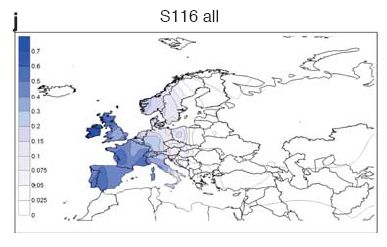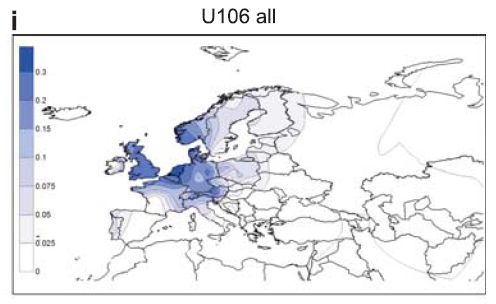[FONT="]You are right for this point. But not for the rest.
[/FONT]
Frankish language was a western Germanic language. Do you consider early medieval France as Germanic ?
Runes have been found in Normandy, British Isles, Ukraine…Do you consider those regions as Scandinavian culture ?
http://www.historic-scotland.gov.uk...ut.htm?PropID=PL_205&PropName=The Norse runes
http://laclefdesrunes.l.a.pic.centerblog.net/bdkd4vpi.jpg
http://www.omniglot.com/writing/gothic.htm
Not really. The Hallstatt culture is truly attested only in Central Europe (Eastern France, Southern Germany, Switzerland, Austria), especially graves with chariots. The regions outside of this central core are at best influences and traces, at worst extrapolations or speculations (Haywood uses the term of “possible” for Iberia).
http://membres.multimania.fr/ayla01/images/carte Hallstatt.jpg
http://pm.revues.org/docannexe/image/365/img-4-small480.jpg
http://www.arbre-celtique.com/etude/01-origines/carte1b.jpg
That’s why making a link between archaeology and culture is speculative (V.Kruta). A Celtic inscription or a Celtic spoon in the ground does not mean that the indigenous spoke here a Celtic language, not more than an old tyre tagged “Goodyear” in the ground of Madrid will mean that Castillan people speak a Germanic language.
Wrong again. The culture of castros are not related to the Celts, but to indigenous pre-indo-european peoples. Because the structure, the dating and the size have nothing to do with the Celtic oppida. You can find below the official archaeological European website of the Celtic oppida, based on the work of Stephan Fichtl. Iberic peninsula is not at all concerned :
http://www.oppida.org/index-en.html
http://www.inrap.fr/userdata/c_bloc_file/6/6921/6712_fichier_dossier20-guichard.pdf
The roman have seen as barbarian all non-roman peoples, whatever the culture they belonged (Iberians, Celts or Huns…).
http://www.etymonline.com/index.php?search=barbarian&searchmode=none
In early medieval France, more than 80% of the anthroponyms were of Germanic origin, and a lot of them are still today among the most wear (see Bernard, Robert, Richard, Henry, Lambert…). Even in Iberic peninsula, some anthroponyms have Germanic roots.
It proves only that Celts have entered in Spain. Nothing else. By comparison, about 10-15 % of the French vocabulary comes from Germanic. And there are many antic Latin words in German language (see Pferd, Pfeil, Spiegel…). It won’t mean that French were Germanics, not more than Germanics were Roman speaking.
[FONT="]
http://www.plattmaster.de/roemer.htm[/FONT]
Celtic culture was characterized essentially by the language of the indigenous, described and attested by the roman texts in Gaul and Britain, but not in Spain. Some authors use the term “Celtiberi” or “Celtici”, but no-one can presume their language. Every other criterion is just the expression of traces or influences, not of culture. The Celtic inscriptions in Spain are probably like the runes in France, Scotland or Ukraine.
The use of the word “Celtiberian” is in its own controversial. Do you know in History “Celto-Germanic” languages or “Germano-Slavic” languages ? No sense. In fact, the Celtiberians were Iberians living in the country hold by the Celtic who where the upper-classes (this is exactly the roman translation of the name “Celtiberi” used for Spain : Iberians from the land of the Celts = hold by the Celts). This analysis is confirmed by an academic author.
Wrong. We have not the same definition of the term “common”. Your links present areas which have maybe 50,100 toponyms ? The question is not the absolute value, but relative. The fact is that the Celtic toponyms are scattered in Spain, sometimes concentrated in some regions. Exactly the same situation as the hundreds of Germanic toponyms in France, where a Germanic language has never been spoken (excepted fringes).
Those Celtic toponyms have never been majority in Northern Spain. For example, I give you below this source about Northern Spain. The source is in French, but if you see pages 20 to 43, you will see that many toponyms or Northern Spain are rather related to the Basque toponymy. For example, Bayona in Galicia is related to Bayonne in SW France, Bescos to Beskoitze (formely Berascoiz), Ezaro in Galicia with the same name in Biscaye…Even the name of Galicia has a pre-indo-european root. And the conclusion is clear (page 5) : the celtic consience in Galicia is nothing else than the result of politic aims (Spanish use the term of “galleguismo”). Many academic authors are quoted in page 5, it is not a personal view :
http://hal.archives-ouvertes.fr/docs/00/33/45/46/PDF/artxiker_TOPONYMES_PORTUGAIS.pdf
In contrary, Celtic toponyms don’t really cohabit with pre-indo-european ones in France (and Britain), excepted for some exceptions. BTW, the same controversy can exist for southern France (Provence, Languedoc, Aquitaine…) where Celtic culture tends to disappear and is as questionable as Iberia.
Not “historians”, but historians that you have chosen. If you want other academic sources, you can check for example authors like Putzger, Konstam or Villar who have excluded Iberic peninsula from the Celtic world. Graves talks about “mythologization” about the Celtic “consience” in Galicia. And it seems that Spanish authors are among the most septic about the increasing “Celticism” in foreign searchers about Spain.
Just some examples :
http://www.ucm.es/info/arqueoweb/numero4_1/articulo4_1_diazsantana.html
http://hsozkult.geschichte.hu-berlin.de/rezensionen/2005-4-070.pdf
(see p. 180)
http://books.google.fr/books?id=SmW...&resnum=1&ved=0CBgQ6AEwAA#v=onepage&q&f=false
So, I maintain : few archaeological heritage (no oppida, few or no chariot, few material… compared to Gaul, British Isles and Central Europe), dispersed toponyms compared to pre-indo-european ones, not attested Celtic vernacular language (in contrary of Gaul or Britain in Roman texts…). The best option is to not make extrapolations from some plates or swords found in the ground or scattered toponyms.
Between ignorants, we will understand ourselves. I am breaking a teenage dream, but soon or later, the reality will have to be admitted. The Celtic problematic in Spain is rather ideological than scientific. It’s neither a shame nor a quality to have a Celtic heritage. Your reaction is the proof : such a thread in Britain or Switerland would have created surprise or indifference at most.
No, they are not : some searchers and a lot of users on the net want to claim Celtic roots from some archaeological traces and toponyms. But the real evidence is that
there is no consensus about this question. There is a huge controversy about the Celtic heritage in Iberia. The maps of the Celts in Iberic peninsula are all different, which is a sign, in contrary of Gauls or Britain.
My Spanish is poor, but the controversy seems to be confirmed here for example :
http://dialnet.unirioja.es/servlet/fichero_articulo?codigo=2374148&orden=0
http://dialnet.unirioja.es/servlet/fichero_articulo?codigo=1083664&orden=0
Even the publications of University of Wisconsin (E-Keltoi), probably the most affirmative about the “Celtic” Spain (and by there one of the least credible…), recognize clearly those controversies. Controversies which are almost marginal in Britain or France.
I have never contested the Celtic “presence” in Iberia. I contest that they should have imposed their culture, like Germanics have not printed their culture in Spain or in Ukraine. Celts have probably formed small communities like some cultural minorities in Balkans, or maybe an artistocratic varnish like Germanics in France. So, we can't claim that Spain was "Celtic" in Antiquity, not even Galicia.
If Celts were a minority among the indigenous population, it is not pointless in a scientific aim. The panick that my contradictor has presented proves that this subject is sensitive in Iberia, not anywhere else.
Genetics are genetics. Culture is culture. The first can't prove or refute the second...




